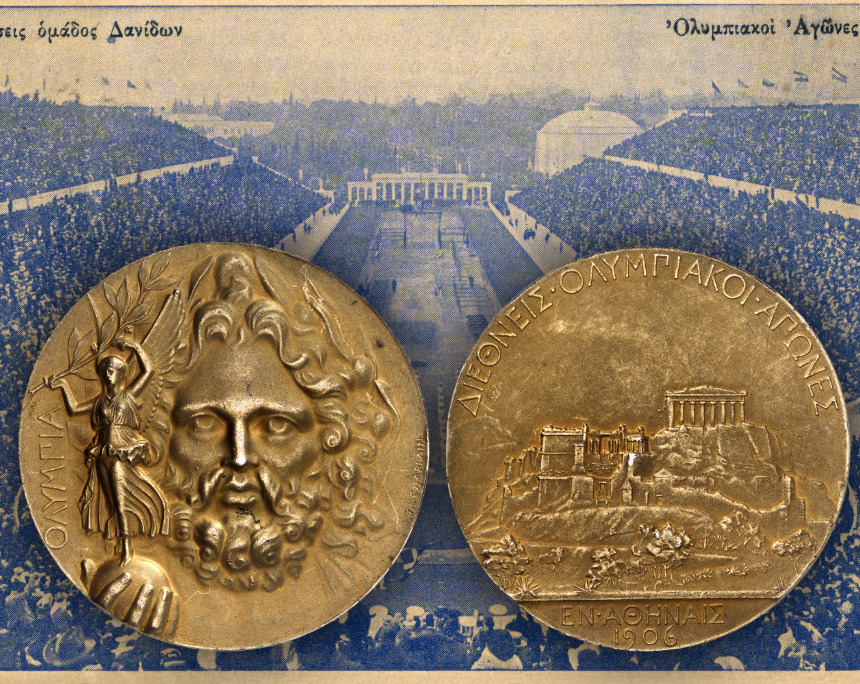The Olympic Games That Are No Longer Recognized
On 18 June 2024, the Künker auction house in Osnabrück will offer a ‘gold’ medal from the 1906 Olympics in Athens, of which probably only 78 specimens were produced. As was customary at the time, the medal is of course not made of pure gold, but gilded silver. Interestingly enough, the 1906 Olympics do not appear on the IOC’s list of Games. We explain why these Olympic Games are no longer recognized as such.
Content
A Great Start Followed by Two Failures
The Olympic movement began in 1896 with the first modern Olympic Games in Athens. They were a major success – particularly because the Greek Crown Prince Constantine took over as president of the organizing committee after an initial IOC organizing committee had struggled with the costs. Constantine managed to raise the necessary funds to make the first Olympic Games in modern history a world-class event.
Inspired by the great success of the Games, King George I, speaking at a banquet for the athletes, called for all Olympic Games to be held in Athens. His proposal was supported by many, especially by the athletes, who appreciated the excellent organization of the event. But Pierre de Coubertin was vehemently opposed to the idea. As a Frenchman, he had reluctantly accepted that the first Games should be held in Greece. In fact, he wanted the first Olympic Games in modern history to take place as part of the 1900 Paris Exposition. Afterwards, the Games were supposed to travel around the world. If King George I had his way, it would be impossible to realize this vision. Coubertin therefore proposed that two different types of Olympic Games should be held in the future: the traveling Olympic Games were to alternate with the Olympic Games in Athens. Unfortunately, this idea proved impossible as Greece was involved in the Greco-Turkish War in 1897 and had no money to host the Olympic Games.
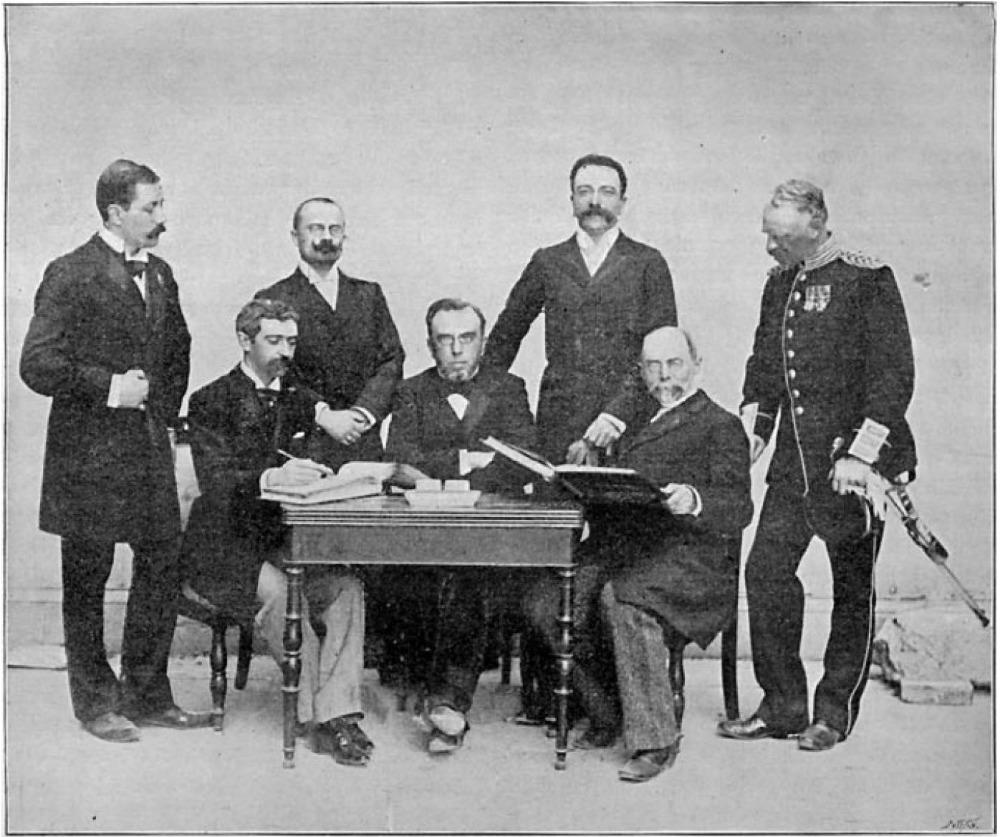
The founding members of the International Olympic Committee (left to right): Pierre de Coubertin, Willibald Gebhardt from Berlin, Jiří Stanislav Guth-Jarkovský from Bohemia, Dimitrios Vikelas from Greece, Ferenc Kemény, Victor Balck from Sweden and Aleksey Boutovsky from Russia.
That is why no one objected to the idea of holding the second Olympic Games in Paris – even though the French people themselves did not want this. Most athletes did not even realize that they were taking part in the Olympic Games. This was because the event was not organized by the IOC, but by the Union de sociétés françaises de sports athlétique, which called the event Concours Internationaux d’Exercices Physiques et de Sports.
The third Olympic Games, held in 1904 during the St. Louis World’s Fair, also were a failure for the IOC. Although the event was called Olympic Games in St. Louis, it was not organized by the IOC, but by the Amateur Athletic Union. That is why Pierre de Coubertin himself prevented IOC representatives from traveling to St. Louis: he scheduled a meeting of the IOC in London just one week before the start of the Games. The fastest ship at the time – the German ocean liner Kronprinz Wilhelm – took 5 days, 11 hours and 57 minutes to cross the Atlantic. Traveling from London to St. Louis in a single week was hardly possible in 1904.
The long and costly journey also prevented many athletes from competing in St. Louis, which is why 90 per cent of the competitors in the 1904 Games were from North America.
A New Beginning in Athens
Rome was to host the Games in 1908, but the Italian organizing committee was dissolved in January 1906. Therefore, the Olympic idea was almost dead when the Greek government announced its plans to hold the Olympic Games in 1906, following Coubertin’s proposal of two types of alternate games. The IOC recognized the opportunity of such games and wholeheartedly supported Greece in this effort – except for Pierre de Coubertin. It seems that the latter was more interested in getting his way than in turning the Olympic idea into a success story.
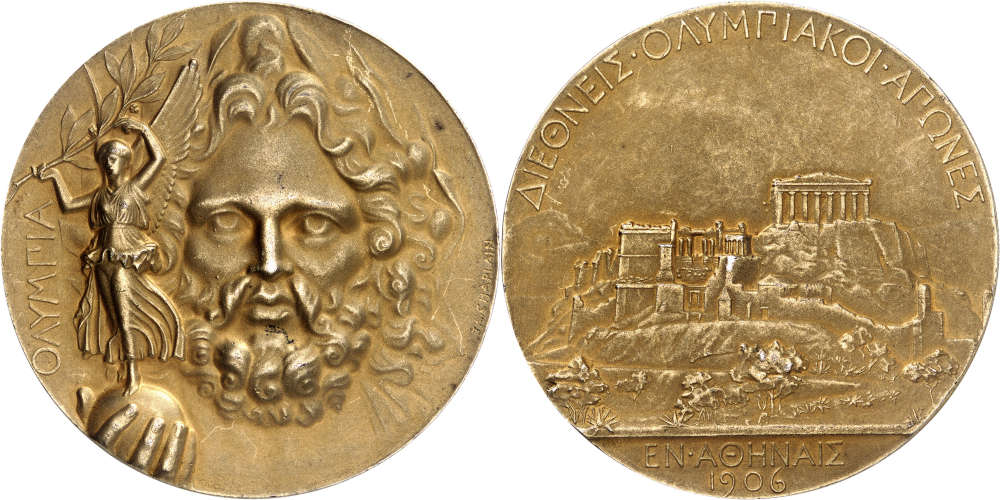
Gilded silver medal for a winner of the 1906 Olympic Games, die by J. C. Chaplain, minted by the Monnaie de Paris. Very rare. Extremely fine. Estimate: 5,000 euros. From Künker auction 408 (18-19 May 2024), No. 122.
With the 1906 Olympics, Greece wanted to continue the tradition of the highly successful first Olympics. This was also reflected by the medals, which were produced by the Monnaie de Paris. Every detail of these medals is the same as on those for the first Olympic Games. On the obverse we can see the head of Zeus Olympios, holding a Nike on a globe in his right hand. The reverse presents a view of the Acropolis seen from the Panathenaic Stadium. Only the year on the reverse was adapted, otherwise the legend is identical to that of 1896: International Olympic Games in Athens 1906 (translated).
A gold, a silver and a bronze medal were created for each of the 78 competitions. Like the piece offered by Künker, the gold medals were not made of pure gold but of gilded silver.
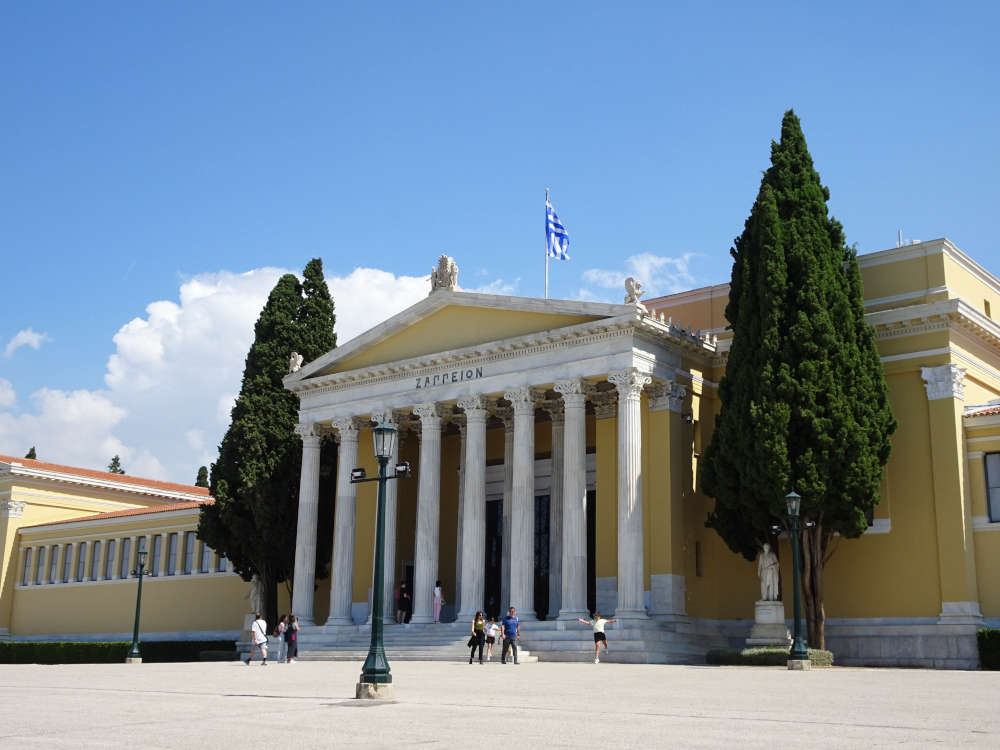
The 1906 Olympic Games were the first to bring all the athletes together in terms of their accommodation. They lived together in a kind of precursor to the Olympic village, the Zappeion. Photo: Photo: KW.
Innovations of 1906 That Have Persisted to This Day
In a complete contrast to the Paris and St. Louis Games, the Athens Olympics were a huge success. There were two main reasons for this: firstly, there was no world’s fair to overshadow the sporting event; and secondly, the time frame was much tighter than before. While the 2nd and 3rd Olympic Games lasted 6 and 5 months respectively, all competitions in Athens took place between 22 April and 2 May 1906.
For the first time, there were delegations from the various national Olympic committees, as athletes had to register through their national Olympic committee. This led to a scandal when the Irish athlete Peter O’Connor won the silver medal in the long jump. As Ireland did not have an Olympic committee at the time, he found himself – much to his annoyance – belonging to the British delegation. And when the British flag was hoisted at the award ceremony, O’Connor climbed up the flagpole to wave the Irish flag from above, while a fellow countryman guarded the flagpole to prevent anyone from pulling O’Connor down.
Speaking of flags: the raising of flags as part of the award ceremony also goes back to the 1906 Olympics, as does the fact that the athletes march in behind their national flags.
However, the most endearing idea that we owe to the 1906 Olympic Games is the shared accommodation for all the athletes. They lived in the Zappeion, which became the forerunner of the Olympic village.
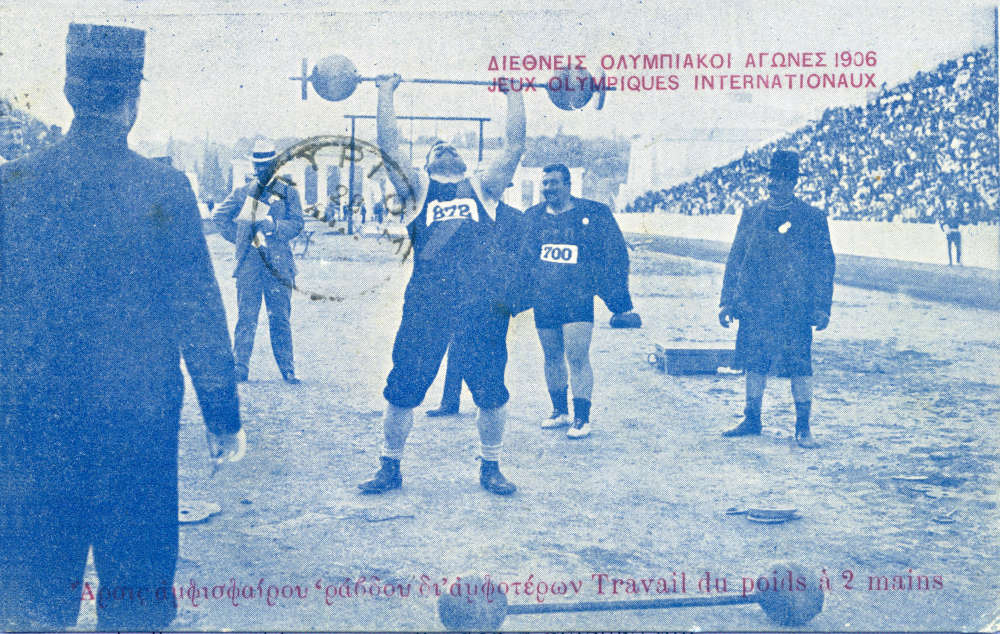
A postcard of the 1906 Olympic Games: weight lifting – the Austrian weight lifter Josef Steinbach won a gold and a silver medal in 1906. From the Nikos D. Karabelas Collection, Preveza / Greece. Aktia Nikopolis Foundation.
A Great Success
The 1906 Olympics became a great success: 900,000 fans cheered on 854 athletes from 20 countries on four continents. For comparison: there were ‘only’ 241 athletes at the 1896 Games.
The press was enthusiastic. A US journalist wrote: “The Olympic Games of 1906 will go down in athletic history as the most remarkable festival of its kind ever held. They exceeded in every way the successful Olympic Games of 1896 … The scenes and incidents and everything in connection with the Olympic Games of 1906 made an impression that will never be forgotten and it is hoped that future Olympic Games will be up to the standard of the ones of 1906.”
In fact, it can be said that it was the 1906 Games that really kick-started the Olympic movement. It was only after this great success that the British Olympic Association decided in the autumn of 1906 to take over the organization of the 1908 Olympics.
Why Did Greece Not Continue This Tradition?
However, the tradition of the Greek Intercalated Games was not continued. This was due to war, or rather due to many wars. In 1908, the Young Turks overthrew Ottoman rule. Like many other Balkan states, Greek politicians took advantage of the weakness of the former empire to annex territories to their own state. The dispute following the demise of Ottoman rule led to the Balkan Wars, which culminated in the First World War. This was followed by the Greco-Turkish War, which ended in the Antallagí. What is downplayed by historians as a population exchange was the expulsion of 1.5 million Anatolian Greeks and 400,000 Greek Muslims.
As a result, Greece’s population grew from 6 to 7.5 million overnight, an increase of 25%. The social and political unrest that followed this huge wave of refugees left no room for Olympic fantasies.
The IOC Does Not Want to Be Associated With the 1906 Games
Following pressure from Pierre de Coubertin, the IOC subsequently withdrew the Olympic status of the 1906 Games – even though the athletes registered through their national Olympic Committees and IOC representatives had supported the Games before and during the event. It was agreed that the Games had merely been the celebration of the 10th anniversary of the first modern Games in 1896.
Of course, this did not stop the British Olympic Committee from incorporating all the good ideas from 1906 into their own Olympics.
The Importance of the 1906 Olympic Games
Although the IOC eventually distanced itself from these games, their importance to the Olympic movement can hardly be overestimated. The 1906 Games, which are no longer recognized as ‘Olympic’ today, paved the way for this movement and revived the Olympic idea at a time when it seemed doomed.
By the way, a request submitted to the IOC in 1949 to recognize the 1906 Games as Olympiad IIIB was rejected.







